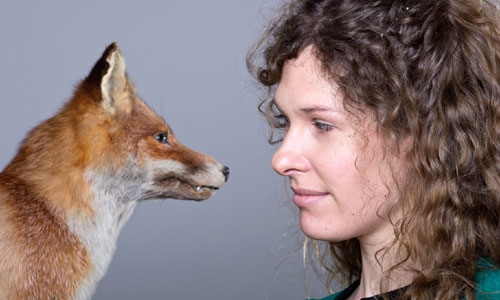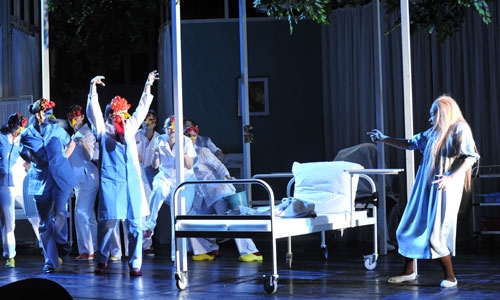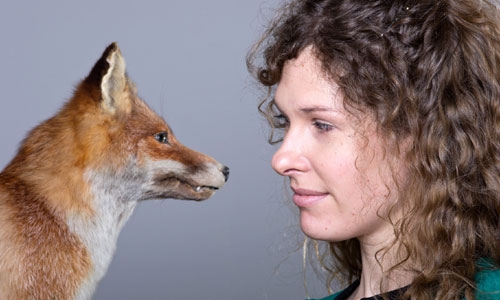Regisseurin Lotte de Beer über ihre Inszenierung „Das schlaue Füchslein“ an der Oper Leipzig

Mit Das schlaue Füchslein ist bereits die dritte Inszenierung von Lotte de Beer an der Oper Leipzig zu sehen. Nach Clara S. und Die arabische Prinzessin inszeniert die junge Regisseurin aus Amsterdam die Oper von Leos Janácek nach der Novelle Die Füchsin Schlaukopf von Rudolf Tesnohlidek aus dem Jahr 1920. Leipzig-Almanach -Redakteur Steffen Kühn traf Lotte de Beer am Rande der Probenarbeit.
Leipzig-Almanach: Dear Lotte, after your first two productions in Leipzig we will see the opera Das schlaue Füchslein. What’s your view on this romantic opera of Leos Janácek?
Lotte de Beer: It is one of the most loving, the most moving operas that I know. The music is deeply poetic, the texts are much layered. I think Janácek has a great similarity with for instance the playwriter Tesnohlidek. They both have this view on mankind that shows its shortcomings very precisely without ever convicting them. The tragic in this piece always has some humor and the humoristic moments are filled with melancholy. Just like life itself.
Leipzig-Almanach: You started in Leipzig with Clara S. from Nicoletta Chatzopoulou. That´s very modern music. How do you feel when working with historical music and historical plots?
de Beer: I feel very privileged that I get to direct both modern and historical pieces. Newly written works are very exciting to do because you are discovering a totally new world. Historical pieces have already proven their quality. There usually is a very good reason that we are still performing them. And since most people have already seen and heard them before, you can tell a more layered story in staging them. The challenge, however, is to stay true to the piece while making it accessible for an audience of today.

Leipzig-Almanach: How do you think about the audience in Leipzig? Does your conception has an impact on the audience in town?
de Beer: It is always difficult to say something about ‚the audience’. It consists of so many individuals. But I think compared to the audience in for instance Amsterdam, the audience in Leipzig is very educated. I was at a ‚Publikumsgespräch’ once after a performance of Pierrot Lunaire and was completely impressed by the very intelligent questions that were asked. People really seemed to know this work very well. It felt like there was an entire audience of dramaturges present! On the other hand I have noticed that some audience members are a bit skeptical of director’s interpretations of pieces. There seems to be a certain fear of modern stagings. I think as a director it is my obligation to take these feelings seriously. Theatre is a dialogue. If there is no audience to communicate with, we have no reason to play these pieces. On the other hand one shouldn’t be lead by fear, by what people might not like. That won’t create the most interesting art. I tried to bring out that what moves me so much in this piece and I honestly hope the Leipzig audience will appreciate that. It is quite sad that so many of the performances get so little audience at the moment. I really really hope that more people will find their way to the opera again. The Cunning Little Vixen might also be a good entrance for people who have never been to the opera before. It is a short piece (90 minutes) and has a film-like quality to it.
Leipzig-Almanach: Could you give a little preview of your conception or do you think it´s better to see the performance without the director’s interpretation?
de Beer: It´s O. K., I can give you a short preview of my conception. This piece actually is a fairytale however not one for children. It is a fairytale for grownups, telling the tale of life, love and death in all its different shades. In our 21st century in which cynics is ever present, fairytales get set aside as children’s stories. In this staging I wanted to tell the tale in a way that the people of today would be able to connect with its poetry. Since Janacek’s time, much has changed in how we see the world. We are much less connected with nature for instance. And we have seen many forms of humanized animals in all kinds of genres of art and entertainment. Sometimes in astonishing technically skilled versions the image of a singer in an animal costume creates a different statement now than it would have then.
Das schlaue Füchslein
Oper in drei Akten
Premiere: 25. 2. 2012 Oper Leipzig



Kommentar hinterlassen